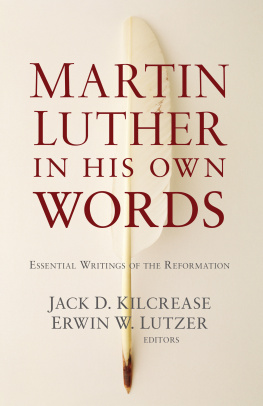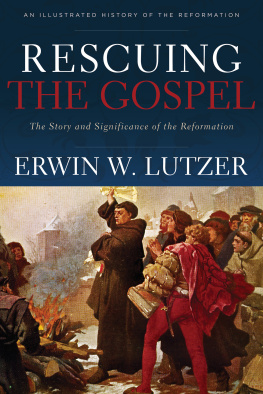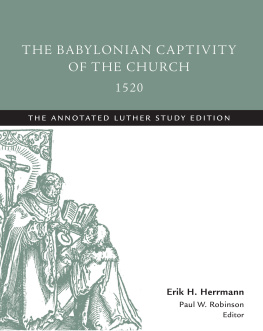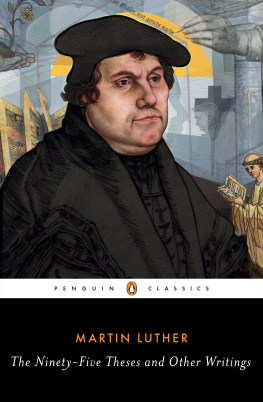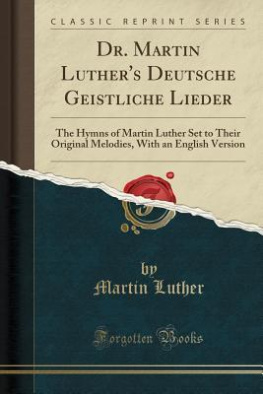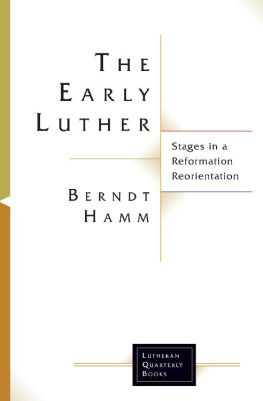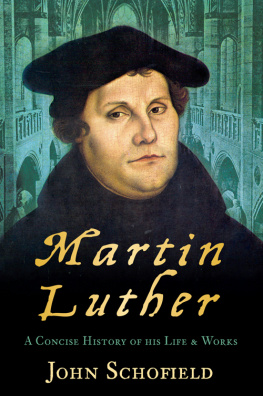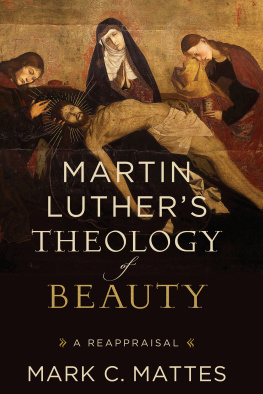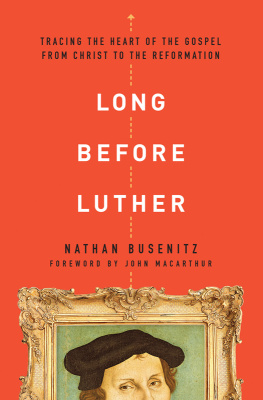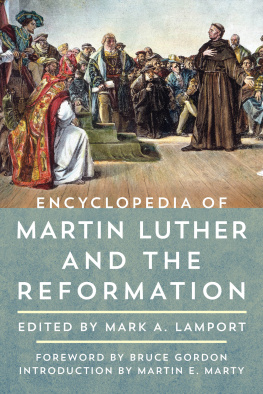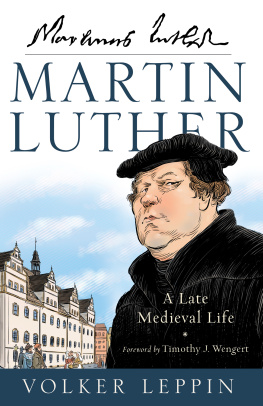Kilcrease Jack D. - Martin Luther in His Own Words
Here you can read online Kilcrease Jack D. - Martin Luther in His Own Words full text of the book (entire story) in english for free. Download pdf and epub, get meaning, cover and reviews about this ebook. City: Ada;MI, year: 2017, publisher: Baker Publishing Group, genre: Religion. Description of the work, (preface) as well as reviews are available. Best literature library LitArk.com created for fans of good reading and offers a wide selection of genres:
Romance novel
Science fiction
Adventure
Detective
Science
History
Home and family
Prose
Art
Politics
Computer
Non-fiction
Religion
Business
Children
Humor
Choose a favorite category and find really read worthwhile books. Enjoy immersion in the world of imagination, feel the emotions of the characters or learn something new for yourself, make an fascinating discovery.
- Book:Martin Luther in His Own Words
- Author:
- Publisher:Baker Publishing Group
- Genre:
- Year:2017
- City:Ada;MI
- Rating:3 / 5
- Favourites:Add to favourites
- Your mark:
- 60
- 1
- 2
- 3
- 4
- 5
Martin Luther in His Own Words: summary, description and annotation
We offer to read an annotation, description, summary or preface (depends on what the author of the book "Martin Luther in His Own Words" wrote himself). If you haven't found the necessary information about the book — write in the comments, we will try to find it.
Martin Luther in His Own Words — read online for free the complete book (whole text) full work
Below is the text of the book, divided by pages. System saving the place of the last page read, allows you to conveniently read the book "Martin Luther in His Own Words" online for free, without having to search again every time where you left off. Put a bookmark, and you can go to the page where you finished reading at any time.
Font size:
Interval:
Bookmark:
2017 by Jack D. Kilcrease and Erwin W. Lutzer
Published by Baker Books
a division of Baker Publishing Group
P.O. Box 6287, Grand Rapids, MI 49516-6287
www.bakerbooks.com
Ebook edition created 2017
All rights reserved. No part of this publication may be reproduced, stored in a retrieval system, or transmitted in any form or by any meansfor example, electronic, photocopy, recordingwithout the prior written permission of the publisher. The only exception is brief quotations in printed reviews.
Library of Congress Cataloging-in-Publication Data is on file at the Library of Congress, Washington, DC.
ISBN 978-1-4934-0648-7
Cover
Title Page
Copyright Page
Introduction
Sola Fide
1. On Christian Liberty
2. Commentary on Galatians: Faith and Works of the Law
Sola Gratia
3. Preface to St. Pauls Letter to the Romans
4. The Third Article of the Apostles Creed: The Work of the Holy Spirit
Sola Scriptura
5. That Doctrines of Men Are to Be Rejected
6. The Bondage of the Will
7. True and False Views of Christs Suffering
8. The Second Article of the Apostles Creed: Jesus Christ
9. Commentary on Galatians: Christ Took Our Sin
Soli Deo Gloria
10. The First Article of the Apostles Creed: The Gracious God
11. The Lords Prayer
12. The First Commandment
A Note about Sources
Back Ads
Back Cover
Erwin W. Lutzer
This is a book you will want to read more than once.
Dr. Jack D. Kilcrease has given a great gift to the church by collecting these writings and lectures of Martin Luther. He has supplied us with a concise introduction to each reading, updated these classic translations of Luthers writings, and provided footnotes that clarify meaning and explain obscure references that otherwise would be unknown to us. Here we see Luthers passion for those doctrines that lie at the heart of his theology, such as biblical authority, sin, grace, faith, Christ, and the distinction between law and gospel.
Why is it important to read Martin Luthers writings and lectures five hundred years after his lifetime?
The answer is quite simple: his influence is still with us, whether we are Catholic, Protestant, or simply enjoying the freedoms we have come to cherish in the West. Luther stood at a pivotal point in history, between the Dark Ages and the Modern Age, between a time of religious oppression and the growing respect for individual conscience. Standing as he did against one thousand years of religious and political traditions, he planted seeds that continued to grow and benefit us even today.
Lets begin with what Luther was best known for: his rediscovery of the doctrine of justification by faith. This doctrine not only made salvation readily accessible to the average seeker, it also shifted the emphasis away from the church to the individual, and in the process undercut the monopoly that the medieval church had over peoples souls. No longer could the pope expect his subjects to obey his official decrees and pronouncements; the people simply did not need his blessing to obtain the salvation that God offered to all who believed. According to Luther, justification meant that God credits sinners with his own righteousness, and this in point of fact is the ground of personal assurance that one has indeed been reborn, fitted for heaven. No wonder he said that this was the doctrine by which the church stands or falls.
Luther also planted the seeds of freedom of religion. In Worms he stood before the emperor and the German princes and boldly declared, Since then Your Majesty and your lordships desire a simple reply, I will answer without horns and without teeth.... My conscience is captive to the Word of God. I cannot and I will not recant anything, for to go against conscience is neither right nor safe. God help me. Amen. When making this clear and simple declaration, he was saying that the conscience of a single monk could challenge the spiritual authority of a thousand years of tradition, the pope, and the powerful grip of the medieval church.
Luther insisted that belief could not be mandated or coerced. The path to religious freedom in Europe would be fraught with conflict, setbacks, and even wars. But once the idea of freedom of conscience had been introduced, it could not be stopped. After Luther, Europe could not comfortably return to religious suppression and the control of a power-loving church.
Alister McGrath writes, Luthers doctrine of justification by faith undermined the credibility of the medieval worldview and put in its place something quite differenta way of thinking that placed the relationship between an individual and his or her God at the center of all things. This was an idea that made a powerful appeal in an increasingly individualistic culture.
One of Luthers most enduring legacies is the translating of the Bible into the vernacular and thereby making the Bible available to the common people. Years earlier Guttenbergs printing press had been invented, and now Luthers writings could be spread quickly throughout Europe, eventually followed by Bibles. Luthers Bible not only freed the populace from centuries of tradition but also gave Germany a unified language and a more coherent cultural expression, and it accelerated the spread of the Lutheran faith.
My parents were Germans who grew up in the Ukraine, and they read to us daily from Luthers translation of the German Bible. Like the King James Version in English, Luthers Bible was updated throughout the centuries, but it served as the standard Bible for Germany and other German-speaking countries. If Luther had accomplished only this task, he would have gone down in history as one of the great men of Germany history. That he had so many other accomplishments is a tribute to his genius, courage, and passion.
Luther believed that the doctrines of the Christian faith should be preached in the language of the people and not in Latin (which few if any of the common people understood). Obviously this exalted the role of the preacher in Protestant congregations. Even in many churches in Europe today, the pulpit, standing as it does above the people, symbolizes that the Word of God is above the congregation. Luther himself preached as regularly as possible when he was home in Wittenberg.
We can neither forget Luther nor ignore him. Even today his writings still constitute a doctrinal divide that has shaped Western Christianity. He wrote and spoke on many topics, such as the relationship of the church and state, Christian marriage, and the growing menace of the Turks who were overrunning parts of Europe. But his greatest contribution had to do with the nature of salvation, the sinfulness of humanity, and the wonder of Gods grace.
As you read these pages expect to be blessed and to have your faith strengthened. You will discover that Luther spoke and wrote with deep conviction, wit, and courage. You will better understand his quest for personal salvation and the great discovery he made while teaching the book of Romans: we can neither attain salvation, nor can we contribute to it. Our only contribution is our sin; Jesus supplies the forgiveness and secures our acceptance before our Heavenly Father. Luther said that when he grasped this, he felt as though he was reborn and had entered the gates of Paradise. Imagine his relief when he could say, My sins belong to Christ as if he had committed them.
Whether or not you agree with every point of Luthers theology, this book is food both for the mind and the soul. Read, contemplate, and give praise to God for the wonder of our redemption. You will discover that for Luther, Christ was always at the center of all things.
Font size:
Interval:
Bookmark:
Similar books «Martin Luther in His Own Words»
Look at similar books to Martin Luther in His Own Words. We have selected literature similar in name and meaning in the hope of providing readers with more options to find new, interesting, not yet read works.
Discussion, reviews of the book Martin Luther in His Own Words and just readers' own opinions. Leave your comments, write what you think about the work, its meaning or the main characters. Specify what exactly you liked and what you didn't like, and why you think so.

